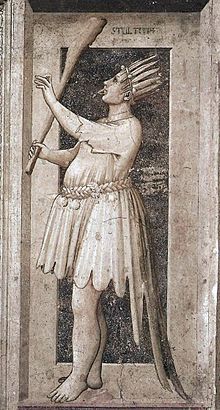Foolishness (original) (raw)
From Wikipedia, the free encyclopedia
Lack of social norms causing offence or similar effect
Stultitia by Giotto—from his fresco of seven virtues and their opposite vices in the Scrovegni Chapel. Stultitia (folly) was shown as the opposite of Prudentia (prudence).
Foolishness is the inability or failure to act following reason due to lack of judgment, stupidity, stubbornness, etc.[1] The things such as impulsivity and/or influences may affect a person's ability to make reasonable decisions.[_citation needed_] Other reasons of apparent foolishness include naivety, gullibility, and credulity. Foolishness differs from stupidity, which is the lack of intelligence.[2] An act of foolishness is called folly. A person who is foolish is called a fool. The opposite of foolishness is prudence. [3]
Andreas Maercker in 1995 defined foolishness as rigid, dogmatic, and inflexible thinking which makes feelings of bitterness and probable annoyance. It is considered the foundation of illusions of grandiosity like omniscience, omnipotence and inviolability.[_citation needed_]
Several proverbs from the Book of Proverbs characterize traits of foolishness.[4]
- Folly (allegory)
- Simpleton
- Silliness
- Ridiculous
- Absurdity
- As a dog returns to his vomit, so a fool repeats his folly – Biblical proverb
- In Praise of Folly
- ^ American Heritage Dictionary of the English Language
- ^ Robert J. Sternberg (2003), "Smart People Are Not Stupid, But They Sure Can Be Foolish", Why Smart People Can Be So Stupid, Yale University Press, pp. 232 et seq, ISBN 9780300101706
- ^ Nathan Rosenstreich, "Prudence and Folly", American Philosophical Quarterly, vol. 22, issue 2, 1985, JSTOR 20014085, p. 93.
- ^ Eldon Woodcock, Proverbs: A Topical Study, p. 20 ISBN 9781579108182

Look up foolishness in Wiktionary, the free dictionary.
